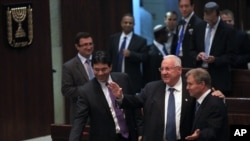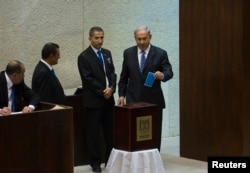Israel has elected as its next president a conservative lawmaker who is opposed to the creation of a Palestinian state.
Reuven Rivlin, 74, is a member of Prime Minister Benjamin Netanyahu's Likud party. He is said to have a frosty personal relationship with Netanyahu.
Rivlin, who has a reputation for political independence, will replace the dovish Shimon Peres in the largely ceremonial, yet influential post.
Congratulating Rivlin at the Knesset ceremony, Netanyahu cited their common history in right-wing politics.
“I know you will do your utmost as president to meet the two-fold mission of unifying the nation and showing unity in the face of external challenges,” Netanyahu said. “I promise, as a prime minister from a similar background, to work with you.”
Netanyahu described Rivlin as a “man of Jerusalem” and a “man of the Land of Israel" and said the new president has two main tasks: to unite the nation internally, and externally to be an ambassador for Israel to the world.
A former speaker of parliament, Rivlin defeated Meir Sheetrit of the moderate Hatnuah party by a vote of 63-53 in a run-off in the legislature, after none of the original five candidates won an outright victory in a first round ballot.
Rivlin prayed that God would bless Israel with “shalom,” peace, and then he made a proclamation:
“Long live Israeli democracy!” he said in Hebrew. “Long live the State of Israel!”
Although Israeli heads of state are not directly involved in political decision-making, Nobel Peace Prize laureate Peres used the presidency as a pulpit for advocating peace with the Palestinians.
Peres, 90, ends his seven-year presidential term in July.
Seeks confederation
Unlike Peres, Rivlin has called for a confederation with the Palestinians rather than negotiating an independent state for them -- something Palestinian leaders have long rejected.
Despite his opposition to a Palestinian state, Rivlin won the endorsement of Israel's left-wing Haaretz newspaper, which noted in an editorial on the eve of the ballot that he had long advocated Jewish-Arab cooperation.
In an interview last month with The Times of Israel website, Rivlin promised that, if elected president, he would not seek to intervene in the decisions of the country's elected politicians on peacemaking or other issues.
Choking back tears at a ceremony in the Knesset after it chose him as president, Rivlin echoed that pledge, saying: “The faith you have shown in me today, in all corners of this house, obliges me to shed, from this moment on, my political role.”
Born in Jerusalem, Rivlin, a former communications minister, is married and a father of four. A lawyer by profession, Rivlin has won widespread support from across the political spectrum for his determined defence of democracy and civil rights.
Last month, Netanyahu floated a trial balloon on the future of the presidency, ordering his advisers to sound out cabinet colleagues on suspending the poll and evaluating the need for the position, political sources said.
Some political analysts suggested that Netanyahu was concerned that a victory by Rivlin, who once publicly accused the prime minister of showing disrespect to parliament, could make him more vulnerable in a future general election.
No single party has ever won an outright majority in a national poll. That makes the president - whose duties otherwise carry little power - a key player in coalition-building.
Robert Berger contributed to this report from Jerusalem, some information provided by Reuters and AFP.
Reuven Rivlin, 74, is a member of Prime Minister Benjamin Netanyahu's Likud party. He is said to have a frosty personal relationship with Netanyahu.
Rivlin, who has a reputation for political independence, will replace the dovish Shimon Peres in the largely ceremonial, yet influential post.
Congratulating Rivlin at the Knesset ceremony, Netanyahu cited their common history in right-wing politics.
“I know you will do your utmost as president to meet the two-fold mission of unifying the nation and showing unity in the face of external challenges,” Netanyahu said. “I promise, as a prime minister from a similar background, to work with you.”
Netanyahu described Rivlin as a “man of Jerusalem” and a “man of the Land of Israel" and said the new president has two main tasks: to unite the nation internally, and externally to be an ambassador for Israel to the world.
A former speaker of parliament, Rivlin defeated Meir Sheetrit of the moderate Hatnuah party by a vote of 63-53 in a run-off in the legislature, after none of the original five candidates won an outright victory in a first round ballot.
Rivlin prayed that God would bless Israel with “shalom,” peace, and then he made a proclamation:
“Long live Israeli democracy!” he said in Hebrew. “Long live the State of Israel!”
Although Israeli heads of state are not directly involved in political decision-making, Nobel Peace Prize laureate Peres used the presidency as a pulpit for advocating peace with the Palestinians.
Peres, 90, ends his seven-year presidential term in July.
Seeks confederation
Unlike Peres, Rivlin has called for a confederation with the Palestinians rather than negotiating an independent state for them -- something Palestinian leaders have long rejected.
Despite his opposition to a Palestinian state, Rivlin won the endorsement of Israel's left-wing Haaretz newspaper, which noted in an editorial on the eve of the ballot that he had long advocated Jewish-Arab cooperation.
In an interview last month with The Times of Israel website, Rivlin promised that, if elected president, he would not seek to intervene in the decisions of the country's elected politicians on peacemaking or other issues.
Choking back tears at a ceremony in the Knesset after it chose him as president, Rivlin echoed that pledge, saying: “The faith you have shown in me today, in all corners of this house, obliges me to shed, from this moment on, my political role.”
Born in Jerusalem, Rivlin, a former communications minister, is married and a father of four. A lawyer by profession, Rivlin has won widespread support from across the political spectrum for his determined defence of democracy and civil rights.
Last month, Netanyahu floated a trial balloon on the future of the presidency, ordering his advisers to sound out cabinet colleagues on suspending the poll and evaluating the need for the position, political sources said.
Some political analysts suggested that Netanyahu was concerned that a victory by Rivlin, who once publicly accused the prime minister of showing disrespect to parliament, could make him more vulnerable in a future general election.
No single party has ever won an outright majority in a national poll. That makes the president - whose duties otherwise carry little power - a key player in coalition-building.
Robert Berger contributed to this report from Jerusalem, some information provided by Reuters and AFP.













